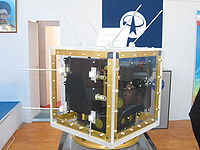
Photo from wikipedia
This paper examines the role of gender in the formation of research collaboration networks, by investigating the composition of networks through connections to diverse professional communities. Drawing on an ego… Click to show full abstract
This paper examines the role of gender in the formation of research collaboration networks, by investigating the composition of networks through connections to diverse professional communities. Drawing on an ego network approach, we examine gender differences among researchers’ networks in terms of partner diversity, openness and brokerage roles. We use data from 897 valid responses to a questionnaire administered to biomedical scientists in Spain, which enquired into multiple aspects of personal research networks. Our findings show that women form more diverse networks and brokerage triads than men. This result is reinforced if we consider the most heterogeneous brokerage triads in terms of professional differences among network partners (i.e., consultant and liaison). Our results suggest that women are more likely to access non-redundant knowledge and richer research perspectives via their knowledge-flow intermediary roles. This research suggests the need for analyses of gender and networks that go beyond a gender-to-gender approach.
Journal Title: PLoS ONE
Year Published: 2020
Link to full text (if available)
Share on Social Media: Sign Up to like & get
recommendations!